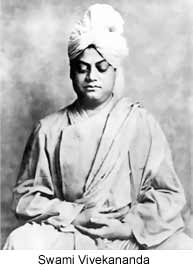

 |  |
 In Bengal, the intellectual mood had been changing under a variety of influences from the 1870s. Defense of Hindu traditions became more respectable as scholars like Max Muller rediscovered the glories of ancient Aryans, and as a romantic cult of the exotic Orient developed in the West, bearing fruits in the Theosophical movement of Olcott and Blavatsky. In Bengal, the intellectual mood had been changing under a variety of influences from the 1870s. Defense of Hindu traditions became more respectable as scholars like Max Muller rediscovered the glories of ancient Aryans, and as a romantic cult of the exotic Orient developed in the West, bearing fruits in the Theosophical movement of Olcott and Blavatsky. A small but influential group headed in the 1880s and 90s by Jogendrochandra Ghosh formulated a media policy to project India's traditional image. Sophisticated and intellectualized revivalism was best represented by the Bankimchandra of the 1880s, reinterpreting Krishna as ideal man, culture hero and nation builder. At a more obscurantist level revivalism was represented by Sasadhar Tarkachudamani and Krishnaprasanna Sen, who claimed shastric precedents for all the discoveries of modern western science. But revivalism was most effective when it sought to appeal to emotions rather than to the intellect: through the neo-Vaishnavism of the Amrita Bazar Patrika, seeking inspiration in Chaitanya rather than the Krishna of the epics whom Bankim had sought to idealize, and above all through Ramakrishna Paramhansa, the saintly Dakshineswar priest who cast a spell over Calcutta's sophisticated intellectuals precisely through his eclecticism and rustic simplicity. In the 1890s, his disciple Vivekanda. leapt to fame after a memorable appearance at the Chicago Congress of Religions. Vivekananda was very far from being an obscurantist or revivalist in any crude sense. One major effect of his work still was to increase the faith of the people in the Vedic religion. Inspired by the Christian model of social service and religion placed together He founded the Ramakrishna Mission in 1897, which has proved an efficient philanthropic organization with no claims to social radicalism. Yet Vivekananda himself had combined passionate evocation of the glories of the Aryan tradition and Hinduism (particularly before Western audiences) with bitter attacks on present day degeneration: 'Our religion is in the kitchen. Our God is the cooking pot.' 'As if religion consisted in making a girl a mother at the age of twelve or thirteen', was his private comment on the Age of Consent furore. He preached a this-worldly type of religion, emphasizing self help and the building-up of manly strength: 'What our country now wants are muscles of iron and nerves of steel.' Equally remarkable was Vivekananda's concern for the plight of the 'Daridra-narayana', the Shudra and the untouchable, his famous appeal to 'forget not that the lower classes the ignorant, the poor, the illiterate, the cobbler, the sweeper, are thy flesh and blood, thy brothers'. In eclecticism precisely lay the strength of Vivekananda's appeal, and his mixture of patriotism with the cult of manly virtues, vague populism and evocation of Hindu glory was to prove heady wine indeed for young men in the coming Swadeshi period. next page >> |
Copyright ©2000 indiansaga.info. All rights reserved.
By using this service, you accept that you won't copy or use the data given in this website for any commercial purpose.
The material on indiansaga.info is for informational & educational purpose only.
This site is best viewed at 800 X 600 picture resolution.